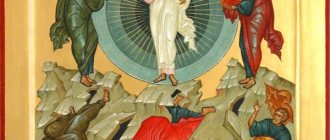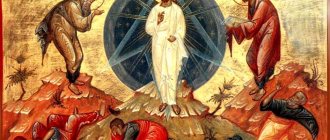What is the resurrection of the dead
The atonement accomplished by the God-man does not abolish personal freedom. Each of us has the right to voluntarily accept the Lord’s sacrifice or categorically reject it, follow the path of faith, confession, repentance, spiritual cleansing, or continue to succumb to passions, moving away from the Heavenly Father and entering into open enmity with Him.
Icon "Resurrection of Christ"
If a person accepts the great feat of Christ, he is voluntarily called to partially repeat the life of the Son of God, that is, a Christian strives to share his death with the Messiah, crucify his own sinfulness on the cross, and transform his nature through the instruction of the Gospel.
Read about Christ:
- Suffering on the Cross of Jesus Christ
- Death of Jesus Christ
- Resurrection of Jesus Christ
Thus, for the Orthodox believer, the spiritual uprising at the end of time becomes the “resurrection of life.” People purified by humility are not drawn to the Last Judgment, since they have already passed from death to true life, that is, God. The souls and bodies of apostates from the faith are also restored, but they are called to condemnation by the Creator of the Universe himself.
- When the time of the second coming arrives, pure human nature will be restored to its flawless completeness. However, this will not affect sinners, because they have personally turned away from the will to virtue. Apostates will experience obvious suffering, which will be used for the sake of their admonition, but in holy people God will dwell mercifully and harmoniously.
- The restored bodies will become incorruptible and immortal, they will not need material food and water. The Apostle Paul says: “The human body is transformed from weak and humiliated into one in conformity with the divine, because the Lord wills it this way, and He can bring it about.” Our ordinary body is called earthly, it is only flesh, but when transformed it is already eternal purity.
- The humble, the holy and the righteous will shine brighter than the sun. This radiance is similar to what the apostles saw on Mount Tabor, where Christ, in his own transfiguration, with the help of prayer to the Father, added the nature of the divine to human nature. Likewise, the saints will shine with inner glory and rise spiritually, receiving grace from God, who will extend his own power to all living beings. Only righteous Christians will receive such a reward, because they know God and go to Him with a clear conscience, while apostates are condemned and continue to suffer.
- The bodies of sinners will not accept divine glory of their own free will; these shells will continue to serve as a container for carnal obsessions. The demons of selfishness will not cease to disturb the apostates; they will take forms that correspond to their desires and thoughts.
Important! The resurrection will happen simultaneously, it will be universal. Righteous and sinful people will receive their bodies similar to those they had during their existence on earth, but their quality will be different - they will all have incorruptible and immortal shells.
Statements about the issue
The Orthodox Church theologically substantiates the need for the rebellion of bodies at the time of the second coming. In her opinion, the body cannot be separated from a full-fledged “absolute” person, therefore it is absolutely fair that the bliss of saints and the torment of sinners is felt not only by souls, but also by bodily shells.
Resurrection of the dead is the resumption of life in the body after death
Both the first (soul) and the second (body) equally participated in the commission of sin (or righteousness), which is why punishment (reward) goes to both categories of human being.
The Protestant teaching on the resurrection does not differ significantly from the opinion of the Orthodox denomination. However, some branches of Protestantism, for example, Jehovah's Witnesses, believe that until spiritual restoration the dead will remain in a state of coma, complete inactivity, sleep, awaiting the awakening of the Lord and the subsequent eternal existence.
For Islam, this issue is also extremely important and is one of the key ones in all teachings. Adherents of the religion claim that restoration will affect both the soul and the body.
The Prophets' Opinion
The oldest references to belief in the resurrection can be found in the story of Abraham and Isaac. The father, without hesitating for a moment, led his son to the sacrificial altar by order of the Lord, because he feared God, knew His instructions and believed in the restoration of bodies. When Abraham was about to kill Isaac and then burn him, a Heavenly Angel stopped him and notified him that he had proven his humility before the will of the Almighty. As a reward for sincere faith, the Lord promised Abraham great offspring.
- Job, who was deprived of wealth, family and health, also knew about the resurrection from the dead. Being alone with his severe suffering, he prayed to the Lord and was consoled by the words that at the end of time this fleshly body would be transformed into an eternal and spiritual one.
- The prophet Isaiah said: “Lord, the dead, faithful to Your will, will live, their destroyed bodies will be restored. They will rise and triumph, having previously been cast into the dust. The earth will give up the dead after it has felt Your quickening dew.”
The Holy Scriptures repeatedly speak of the resurrection of the dead. - The prophet Daniel predicted: “The dead will rise: some to find eternal glory, bliss and peace, while others will accept in their nature the condemnation of sins, shame and great suffering, according to their personal choice. The righteous and wise will shine like suns, the foolish will be plunged into darkness.”
- The Savior himself repeatedly spoke about this; he prophesied about the coming of the time when the dead would hear the voice of the Lord calling them to Himself. Through divine power, the remains will be reunited, take on the appropriate form and gain life. The resurrected will be divided: some will go to God, others will be condemned to hellish torment.
- Christ also advises that the Sacrament of Communion be performed by consuming bread (the flesh of the Son) and wine (the blood). These people will be restored to the eternal triumph of unity with God. The Savior answered the Sadducees: “You are mistaken if you do not know the power of God and the Holy Scriptures; for the dead (that is, apostates) there is no Lord, He is for the living (the righteous).
The purpose of Christ's first coming was to point humanity to eternal life. God loves His creation so much that He did not regret giving His Son so that everyone would learn about eternity and not perish in sin.
Important! The truth of the resurrection was never in doubt for the apostles; they proved it through a close connection with the rise from the tomb of the Savior himself. The Son of God, according to his disciples, became the firstborn of the resurrection. They added: “All die through Adam (the fall), but are made alive in Christ (faith in God).”
Opinions of the saints
St. John noted: “Creatures will rise in the flesh, with bones, with muscles, hair, and will remain so forever, only they will be illuminated by a bright light that was not there before. The resurrected righteous will be completely freed from exhaustion, all kinds of illnesses, and material needs. In such bodies, spirituality and heavenly bliss will prevail; life in these shells will be similar to the existence of disembodied angels.
Saint I. Chrysostom notes that death must be considered from a twofold position, therefore the rising from the dead becomes twofold. Initially, a person is resurrected from sinfulness, for he is restored together with the Lord through Baptism. By uniting with God, we come into true life. The second resurrection is the return of our physical body.
The Christian's hope for eternal life is based on faith in the resurrection of Jesus Christ
The Monk Simeon makes an educational comparison, he says: “Just as a body without a soul cannot be called alive, so the soul will remain dead until that time, until it enters into indescribable unity with the infinitely powerful, merciful and blessed One Lord, who alone can be called Truth, Life, All That Is.
EX-Pharisee
The last article was not enough to understand what determines the resurrection of the body.
The most difficult problem for me is the problem of the relationship between the resurrection and the communion of the body and blood of Christ. And Christ does not promise eternal life to everyone. The Apostle Paul said this clearly: And just as all who are partakers of Adam die, so all who are partakers of Christ will be brought back to life . (1 Cor. 15:22) Partakers. (!!!) And all humanity is involved in Adam, but not all people are involved in Christ. And the selectivity of salvation is natural, based on the work of salvation that the Lord accomplished. After all, the vast majority of Christians confess that God does not save anyone by force. Salvation is a voluntary matter, just like faith in Christ. And only those who believe in Him participate in Him, and this faith is manifested in works of faith (repentance, communion, fulfilling the commandment of love for God and neighbor). And now we need to understand and figure out whether communion, as a matter of faith, is a prerequisite for resurrection. For eating the flesh and blood of Christ is the central commanded ritual from Christ himself in His work of saving people. If it were not important, the Lord would not have spoken such words. ...if you do not eat the flesh of the Son of Man and drink His blood, you will not receive life (John 6:53) This teaching about salvation is especially difficult to reconcile with the Orthodox dogma of the general resurrection.
The work of salvation
What is the essence of Christ's work to save people?
The Word became human, taking on sinful human nature. The union took place through the Holy Spirit at the conception of the Virgin Mary. Nature was corrected, most likely, to the state of Adam’s perfection before the Fall. And the Lord instituted a method of instilling His perfection in the consecration of bread and wine, which he called body and blood. And if so, then He gives us union with Himself through this sanctification.
Having the Spirit of the Father in him, Christ could not have died a natural death from old age. But this was not necessary, since the Lord, establishing the New Covenant with people, sanctifies it with his sacrifice. In the religions of that time, nothing serious happened without sacrifice. And even more so, taking upon himself all the sins of the people who believed in Him. (When an animal was killed in the Old Testament temple, the priest laid his hands on it, as if transferring onto it the sins of the one for whom this sacrifice was made) And Christ turned out to be the sacrifice that took away the sins of those who believe in Him and those who fulfill His commandments. I don’t even remember the mission to fulfill the predictions of the Tanakh (Old Testament), it goes without saying.
Thus, the Lord experienced a violent death, and His body was resurrected in a new quality. It became more perfect than the one he had, and in principle incapable of decay. The Lord was the first to walk this path, having life in himself. And we receive an inoculation of His perfection (the life he wants to give us), and the hope that we can be resurrected. If we partake of His flesh and blood, then He is in us, and we are in Him. And just as He was resurrected, so we will be resurrected. But is it possible for others to follow this exact path, even for those who have believed and been baptized in the Name of Jesus, even to the point of fulfilling the commandments and confessing?
Based on the assumptions and analysis in the previous article, probably not. Except perhaps the ransomed righteous of mankind. The rest of the state of souls must wait for the resurrection “on the last Day,” if it is to be universal. Where doubts about universality come from, the time has come to formulate them.
Communion of Christ
There are words of Christ himself that do not indicate the universality of the resurrection, but, on the contrary, speak of its selectivity. 54 He who eats My flesh and drinks My blood has found eternal life—and on the last Day I will raise him up . … 56 Whoever eats My flesh and drinks My blood lives in Me, and I in him. 57 And just as I, sent by the living Father, live through the Father, so he who eats Me will live through Me. … But whoever eats this bread will live forever.” (John 6:54-58)
Thus, if a person did not partake of the Body and Blood of Christ, then he did not receive the guarantee of resurrection, that grain of the future perfect body in which the righteous soul must be clothed after the death of the imperfect body. Well, or that leaven that was put in three measures of flour.
Everything seems to be correct. And it even agrees with the faith of the apostles and Old Testament ideas. 2 And of those who sleep in the dust of the ground, many will awaken : some to eternal life, others to shame and everlasting shame. (Dan. 12:2) Again we see that not all will be resurrected, but “many of those.” But the selectivity criterion is not specified. Well, this is what the Apostle Paul says about the non-universality of the resurrection. “... when the word of command and the voice of the archangel is heard, when the trumpet of God sounds and the Lord himself descends from heaven, then first those who died with faith in Christ will rise , 17 and then we, the living , will be carried away with them on the clouds to meet in the air of the Lord” (1 Thess. 4:16-17) We see a direct indication only of the resurrection of the Church. We see the same thing in the above statement. And just as all who are partakers of Adam die, so all who are partakers of Christ will be brought back to life . (1 Cor. 15:22)
Thus, a cardinal question arises. What is a participle? What is the bread and wine in the cup? Christian mystical energy drink with the nefesh of Christ through the Holy Spirit, or is this a confirmation of my faith in the death and bodily resurrection of Christ (“reasoning about the Body”)? I hope it is clear why such a statement arises. Because if we firmly accept the words of Christ that only those who receive communion will be resurrected (and if we do not remember the billions of sinners and the statements in Scripture that some sinners will definitely be resurrected), then, in any case, the formulation of the following questions is fair.
- If we can now receive communion and can receive the guarantee of resurrection in the body through communion, then how will the righteous who died earlier receive this guarantee before the coming of Christ? And will there be a resurrection for them at all? Or will they live in a state of souls?
- What exactly does the communion of the Body and Blood give to dead Christians of the new era in the matter of salvation in comparison with the posthumous fate of non-Christians, based on the laws of the universe for everyone? For example, how can a Buddhist who has lived according to the law of conscience all his life be resurrected for justification?
- If a person took communion, but remained a sinner and died as such, will communion serve as his justification? Can we consider that such a person was blessed in the sacraments in which he participated during his life?
- What is the relationship between faith in Jesus and the participation of mystical substance in the Remembrance of Christ's death?
Faith and efficacy of the sacrament
The following comparison of what Christ said in different situations can testify in favor of the symbolic understanding of the sacrament. At the Last Supper, he said to the wine, “This is My blood,” and to the bread, “This is My body.” But in another situation, on the cross 26 Jesus, seeing his mother and next to her the disciple whom he loved, says to the mother: “Woman, here is your son.” 27 And then he says to the disciple: “Here is your mother.” (John 19:26-27) But the apostle did not become the real son of the Virgin Mary. Therefore, calling wine and bread blood and body can also be a figurative expression. Maybe the Baptists are right? We don't know how it really is. But the fact that many were sick and even died, according to the Apostle Paul, from unworthy communion, leads to the idea that the matter is not only in the image of the future Sacrifice and the sanctification of the New Testament.
I wrote above that the Lord, having completed the work of salvation, gave us an inoculation of the perfection that was in Him. He called Himself the Way, the Truth and the Life. And he gives us communion of this life through joining himself. The start of this occurs in Baptism into the death of Christ, and strengthening in spiritual life through the Remembrance of His death. This can happen through a confession of faith in the death and resurrection of Christ, or maybe through the giving of grace along with the holy gifts.
Therefore, I personally am inclined to think that in the sacrament there is both a manifestation of my faith and the grace of the gifts themselves. At the same time, grace is conditioned by my ability to perceive this grace. That is, the power of Christ is in all gifts. And this ability is due to my faith not in the Eucharistic gifts and the obligation of their consecration, but in the death and resurrection of Jesus Christ. If a person does not believe, then for him it is just bread and wine. Otherwise, you will have to admit forced salvation and communion of grace. Without faith. Moreover, even conservative Orthodox dogmatic theology affirms the impossibility of forced salvation. That is why it is impossible to forcefully impart grace. You can only have a snack.
To consider that the sacrament is just a symbol of my faith and its objectivity would be inconsistent with Christ’s direct indication of his presence in gifts, for the soul is in the body and blood of its owner. And since Christ was conceived by the Holy Spirit, then in wine and bread we are given help for the descent of the Holy Spirit on us. And whoever takes communion with faith receives help. And those without faith do not receive communion at all.
I wrote in the work on grace that like is perceived as like. But if a person does not have faith, then the spiritual from God passes through the body and soul like water through a fishing net. Only bread and wine are assimilated in the body. And therefore, such a person will not receive leaven into himself, and, therefore, the promises of resurrection and eternal life, which apply to the disciples of Christ who are not going to the Judgment, do not apply to him. The degree of assimilation depends on the strength of faith. One sacrament was enough for Mary of Egypt almost to death, but for some, hundreds of sacraments help little. Because faith was not manifested in its main task - repentance.
So, the sacrament is effective, it helps to be saved, but is it a prerequisite for resurrection (putting on the soul in the body)? What is resurrection, and what determines the possibility of resurrection?
Independence from the sacrament: the principle of resurrection
The answer to the previous question is very simple in the second part. Christ had life in himself and had the power to sacrifice it and return to life. People are resurrected only by the will of God. But the first part needs a little comment.
I think that the ability for resurrection as such is determined by the nature of our soul and its ability to put on a body, and the vesting itself simply depends on the will of God, or automatically after the occurrence of some event provided by God. That is, everyone has the ability to resurrect. Otherwise, how will the Old Testament people be resurrected, as if all of them had not received communion? And the ability to resurrect is determined by a similar principle as in plants. A person dies like a seed planted in the ground. The shell is destroyed, and a new body is formed from the “DNA-soul”, intended for life in another heavenly world. 35 But someone will ask: “How are the dead raised? And what will their body be like when they return?” 36 Stupid! The grain you sow does not spring back to life until it dies. 37 And you do not sow the whole plant, but simply a grain , wheat, for example, or some other kind. 38 And God gives him the bodily form that he intended ; This look is different for everyone. … 42 It’s the same with the resurrection of the dead: corruptible things are laid in the ground, and incorruptible things rise up; 43 the ugly is laid down and the beautiful rises up; the weak is laid down, the powerful rises; 44 the material is laid down - the spiritual rises . If there is material, there is also spiritual. (1 Cor. 15:35-44)
Imagine a potato or grain. And note, this is not a whole plant with tops or ears, this is just its small, but main part - the fruit of life (like a soul in a body). Finding itself in favorable conditions of heat, moisture and light, the principle of growth, renewal and reproduction, which is the basis of the seed by the Creator, gives birth to something new from the old - a sprout. As it grows, the source gives up all the nutrients it contains to the sprout, and the fiber and shell that held the nutrients disintegrate and rot in the ground. And the sprout becomes a plant of a different quality in relation to the seed.
The human body formed the soul throughout life on earth, providing the heart and mind with food for knowledge and emotions. Therefore, the soul is the seed, and the body is the tops . If this “seed” contains the Holy Spirit at the moment of death of the body, then the soul is capable of resurrection in the likeness of Christ. The presence of the Holy Spirit is like favorable conditions for the seed. Such are added to those “ransomed from the human race.” And the remaining souls turn out to be seeds that will be stored in storage. Before storage, some will have to be treated with chemicals against pests and many will have to be “dried” in a certain place that begins with the letter “a” and ends with “d”))). Each, according to the degree of dampness. And some will turn out to be seeds of chaff. They will be burned, and probably without a trace.
That is, the soul, as you understand, will be clothed with a new body (new “tops”), and the body that was laid in the ground in the cemetery will not be resurrected. The resurrection of the body remaining in the earth is purely human and Old Testament in the resurrection of the dead. It was difficult for the ancients to explain the correct meanings. And therefore in the prophecy of Ezekiel we see the restoration of people from bones. But it was a promise for the ancients to restore them to the level of their understanding. If it were so, then many people, including innocent ones, might not have been resurrected.
After all, many particles of rotten bodies became building material for other bodies. Some were burned in crematoria, some were digested with their bones by sharks, boa constrictors, crocodiles and lions (including martyrs). How many innocents were burned at the stake! Billions could stupidly burn to ashes during the third world war. After all, at the epicenter and not far from it, solid bodies turn into plasma, and human bodies turn into practically nothing. If the Apostle Peter predicted that the heavenly bodies would melt in fire and “the earth would disappear,” then what kind of rising from the graves can we even talk about?! The planet will turn into plasma and a universal crematorium for humanity! Therefore, the body, in Paul’s phraseology, is clearly the whole plant, the tops, and the seed is the soul, from which, by the will of God, a new perfect “plant” can grow . And here the apostolic understanding radically diverges from the Orthodox, which made the body a seed in favor of the Old Testament understanding of the resurrection.
Jehovah's Witnesses have enough touching pictures in magazines, which I call “happiness in a cemetery.” But we understand that the resurrection will be from the cast that the old body left in the human soul. The soul is the source for a new perfect body. After the soul is tested by fire and does not burn, the Lord will clothe it in a body, its personal one, developed by a past life, but perfect and new in substance (like Christ’s after the resurrection), which will allow him to live in Heaven like angels. When God raises the dead, they no longer marry or be given in marriage. They are like angels in heaven. (Matthew 22:30) And so the apostles believed. There is a minimum of my speculation here. The Apostle Paul directly said that the grain that you sow does not spring to life until it dies. 37 And you do not sow the whole plant, but just a grain. And those who think that it is the old bodies that will be resurrected figuratively plant a whole plant.
The resurrection in the apostolic understanding seems to have been sorted out. But a serious question arises. What to do with faith in the general resurrection? The likelihood that it will not be universal is confirmed by the parables of the cut down barren tree; about grass thrown into the fire; about the tares being burned without a trace, while the “wheat” will go to God’s granaries. From understanding this issue, our understanding of the fate of those saved of varying quality and those who will hope for justification will become clearer.
Independence from Communion: General Resurrection
There are enough statements about the resurrection of sinners for Judgment (justification and condemnation) in the New Testament, and they indicate, at a minimum, the independence of the resurrection from the mechanics of communion and the direct partaking of the Eucharistic gifts. More common is dependence on faith in Jesus. But there are indications of resurrection even without regard to faith in general, when it comes to the general resurrection.
I have the same hope in God that they themselves have, namely, that there will be a resurrection of both the righteous and the unrighteous. (Acts 24:15) Nothing is said here about the conditions of faith, baptism, or communion. And we know that there are plenty of scoundrels and sinners who have received communion and been baptized, walking along the broad road. More than the righteous. Therefore, the words of the apostle do not prove or deny anything, but simply state how the ancestors believed and how the apostle himself believes.
28 For the hour is coming when all who are in the graves will hear His voice and leave the graves - 29 those who did good will rise to Life, and those who did evil will rise to Judgment. (John 5:28-29). But the Lord said that the voice of the Shepherd is heard only by the sheep that follow him. The rest do not hear His voice, and when the time comes to resurrect, they may not hear. They may be sinners or righteous, but there must be a grain in them that will allow them to hear His voice.
He has already determined the day when He will judge the world with righteous judgment, and He has already appointed a Man who will be the judge. He gave proof of this to all people by raising Him from the dead. (Acts 17:31) Here it is said about the whole universe and it is said in the Areopagus to the obvious pagans. So the apostle believes in the universality of standing at the Judgment (except for the redeemed 144,000). But let us note that in the two previous quotes from Christ and the apostle, the word “resurrection” is not used (although the synodal word says “resurrection”), and souls can also be subjected to Judgment. But the soul can hardly bear adequate punishment for what it did in the body on earth. Therefore, we can assume that the evil ones will also be resurrected. This is indirectly confirmed by the Apostle Peter: the Lord knows how to save the godly from trials, and save the unrighteous for punishment on the Day of Judgment (2 Pet. 2:9)
The overwhelming majority of the unrighteous did not receive communion at all. But some of them will be justified at the Judgment (after all, that is what the Judgment is for, so that there are justified and convicted, and not just the latter), and will also receive eternal blissful life in the resurrected body. The Apostle, listing the conditions of justification and salvation, names faith, confession, repentance, love. And not once does he remember communion as a church-forming, saving or justifying action. The thief on the cross did not receive communion, and was not even baptized (but only believed and repented), and ended up in heaven. Yes, he ended up there in spirit, but he probably has every chance of being resurrected along with the church. I think that such forgetting of the sacrament in conditions of salvation is a consequence of the naturalness of the constant confession of faith in the Supper of Remembrance of the Death of Christ. This is an element of confession (we believe - in justification, we confess - in salvation). And if a person receives communion with faith and receives union with Christ, and does not just drink wine and chew bread, then at the resurrection he will also not go to Judgment, but he will not reign with 144,000.
Thus, communion with faith and grace forms the second group of saved humanity, which in the state of souls will wait for the Second Glorious Coming and the general resurrection. That is why it says in 1 Thess. 4:16-17 only about the resurrection of those who have died with faith in Christ, that this will be the resurrection of those who do not go to judgment. And only after this will the books of life be opened for everyone else to justify or condemn.
Thus, to put it very succinctly, the Savior saves from Judgment and gives eternal life and bliss immediately after the death of a person. Although there will be two groups of resurrection in the body, both of them will be redeemed from the process of indictment and acquittal at the Judgment, and will receive different glory and honor. That is, resurrection as such does not depend on the sacrament. Only resurrection to salvation depends on communion (moreover, effective, with faith and confession).
Separation of Righteousness
All Christians are well aware of the passage in the Second Epistle to the Corinthians, which they like to refer to in order to prove the possibility of the soul leaving the body (although in the RBO translation this possibility is taken away). 2 I know one Christian who, fourteen years ago (I don’t know, in reality or in a vision, only God knows) was captured and taken up to the third heaven . 3 Yes, I know such a person. In reality or in a vision - I don’t know, only God knows - 4 he was transferred to Paradise and there he heard ineffable words that a person cannot divulge. … 7 I had such revelations! (2 Cor. 12:2-4, 7)
...third heaven. — According to ancient ideas, the sky consisted of several spheres, the number of which varies in different sources: three, seven and ten. Here the third heaven is considered as the highest sphere - the place where Paradise is located.
In Paradise, probably, are those who gather symbolically 144,000. This place is clearly for Paul, because his future home was shown to him. The Second Heaven may include everyone who, in a state of souls, awaits the resurrection, and does not go to the Judgment, being a member of the Church, but they do not fit into the strict criteria of the Third Heaven. And in the first Heaven, probably, there are all those who escaped the clutches of hell and purgatory, and also await the resurrection at the end of time. In the first Heaven there can be both Christians and non-Christians, and even atheists who lived “according to the law of conscience.” They hope for an acquittal. Although maybe those in the Second Heaven also hope for justification. To say anything exactly about such things is sheer madness. But with a high probability, all celestials will be saved from eternal death.
This distribution of souls in Heaven is my conjecture. He makes no claim to the apostolic tradition. But the principle of raising heaven, depending on the righteousness of those who inhabit it, can take place. Therefore, these considerations can be useful for drawing up ideas about salvation after the death of the old body.
conclusions
I don’t know how exactly everything will actually be in the afterlife of souls. These are my guesses, which may not be completely correct, because the Apostle Paul in one place says that he, too, will have to stand in judgment before God (though it is not clear whether he was talking about a private or final Judgment). After all, we will all have to appear before the Judge - Christ, so that everyone receives what he deserves for everything that he has done during his bodily life - both for good and for bad. (2 Cor. 5:10) If Paul says this, what should he say to others? Although, what has been said is more like an appearance at a private Judgment, since he says this to faithful Christians. And he had already been shown his resting place in the third Heaven.
Despite the abundance of references to the Holy Scriptures, I cannot call everything written above an apostolic tradition in views on salvation and justification. But 80% percent is possible. With the exception of an attempt to reflect on chiliasm, the structure of hell and Heaven and the heavenly separation of righteousness. In this part of the original meanings there is only half, and half is speculation. And I do not assert anything and do not write my textbook of dogmatic theology. Although, if you add up the last 8 articles, you get a quarter of the textbook))). This is a modern interpretation of a 2000-year-old text by a person who believes in Christ. If someone believes differently or simply does not agree with what is written, I will not foam at the mouth to prove that I am right. Because in such things a person can only get closer to the truth, but he cannot know everything. And everyone approaches this truth from their limited human side. Therefore, take everything written above as ideas for reflection on how to think about salvation and justification today, based on what we know from the Holy Scriptures. Some confessions and denominations dogmatize private arguments similar to mine, and this is the basis for the division of Christianity today. Therefore, when confessions dogmatize the unknowable, reflected in ancient texts with hints and images, it is from the desire to build partitions, and not from love for one’s neighbor, and the desire to save as many people as possible .
Main conclusions for ideas about how the salvation of the Church and non-church people can be presented in line with what is written in the New Testament.
- There are those redeemed from the human race who are resurrected after death on earth and replenish the 144,000. Their salvation is immediate and unconditional. They are in paradise in the third heaven
- There will be those who will be resurrected to life and will not go to Judgment. (John 5:29), (1 Cor. 15:22), (John 6:53). These are those who were baptized, had the love of the Spirit in them and confessed Christ. The key forms of confession are preaching to the unbelievers and remembering the death of Christ with the faithful. Such members of the Church will rise with the Last Trumpet, and will meet the Lord as the Church of the faithful. Their resurrection is conditioned by the end of History, until which they will remain in blissful state of souls. (Parable of the Rich Man and Lazarus). They are in paradise in the second Heaven.
- There will be those who will rise for Judgment (John 5:29). These are all the other souls awaiting judgment in the first Heaven, Purgatory and Hell. Only those who were not completely burned in hellfire will be resurrected. They will be resurrected immediately after the resurrection of the Church, which does not go to Judgment.
- And there may be those who will not be resurrected at all, if they turn out to be “tares” that will be burned without a trace. It’s hard to say whether it will be immediately after a private trial or during the second death. But if the outcome of the Court is known to the Judge in advance, then some may not make it to the Court. And there is nothing unscriptural about this if you have read this article carefully.
Clarification of the posthumous fate of souls is needed more for orientation in understanding salvation, as a consequence of the work of Christ for those who believed in Him and became faithful. We just have to find out the main thing. What kind of student do you need to be in terms of your manifestations in order not to go to the Judgment? And here we need more clarity, based on the apostolic teaching, without any speculation. More about this next time.









